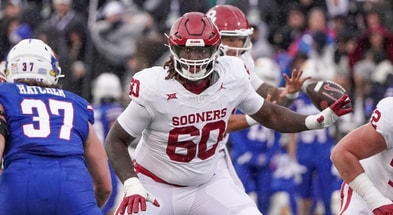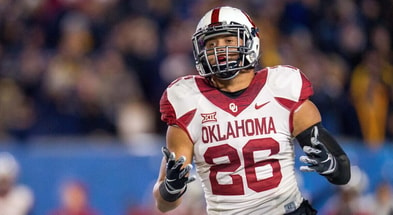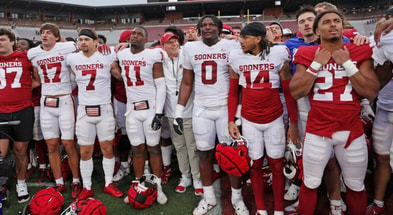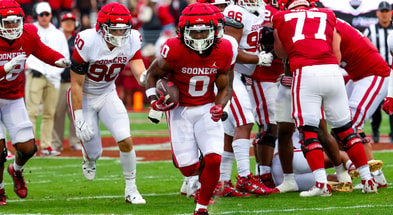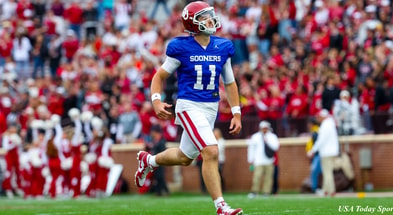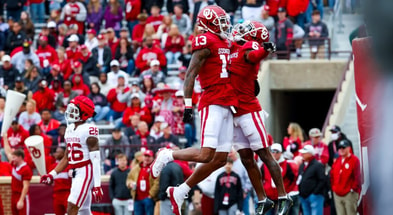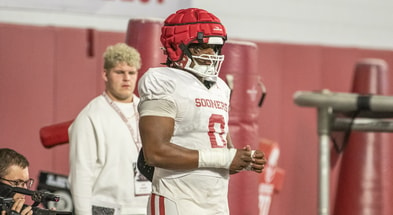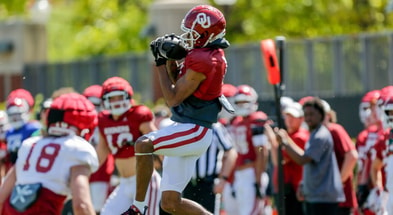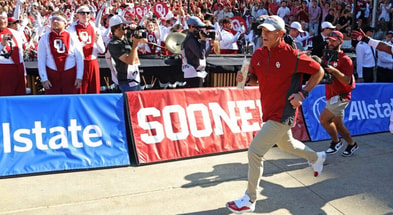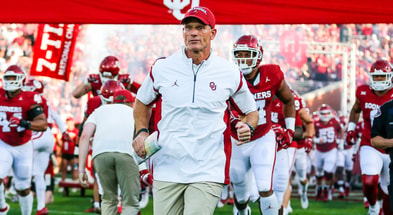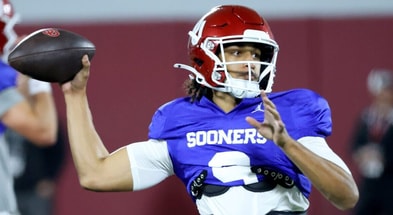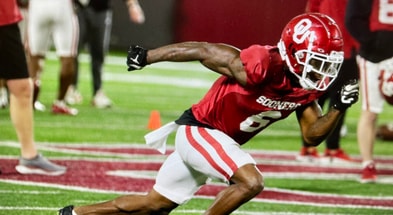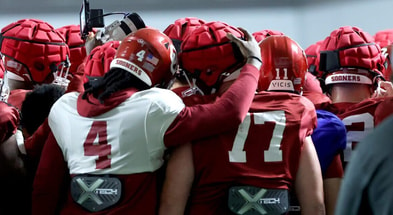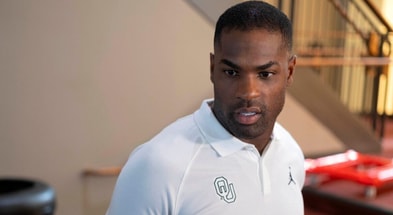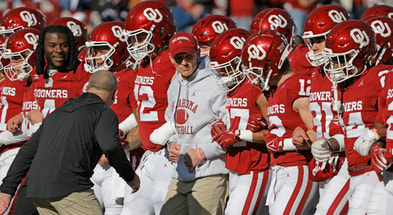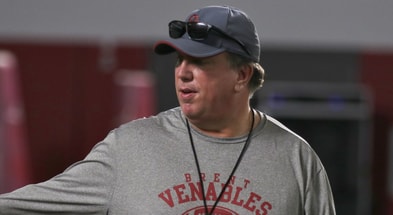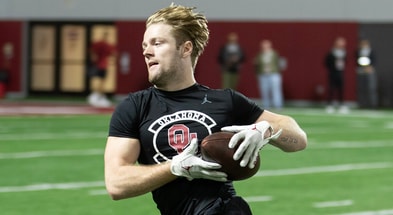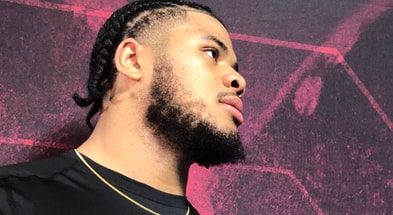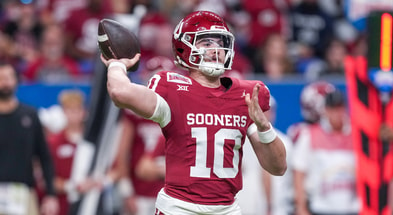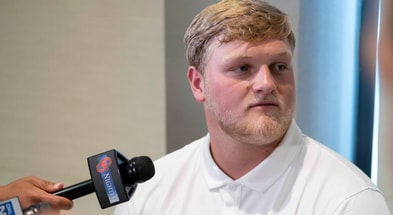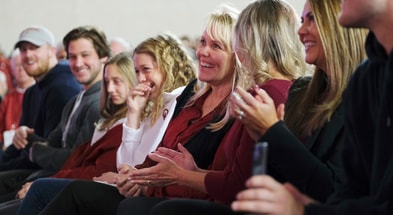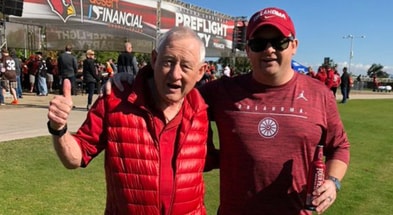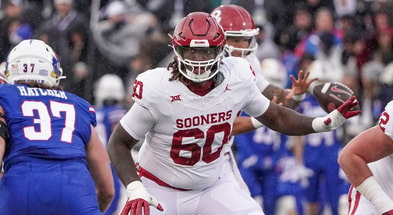How Ryan Hybl turned Oklahoma into a golf powerhouse
Nate Hybl still has the recommendation letter he sent Oklahoma athletic director Joe Castiglione in June 2009.
Castiglione reached out to Nate, who played quarterback at OU from 2000-02, wanting to know about Nate’s younger brother, Ryan Hybl. Castiglione was in the middle of a search for his next men’s golf coach and a 27-year-old Ryan was on his radar. The only issue was that Ryan had little coaching experience, having spent most of 2009 playing professionally and serving as an assistant coach at Georgia from 2005-2009.
“Joe, I know Ryan’s green,” Nate wrote, “but if you meet with him, you’ll fall in love with him.”
A couple of weeks later, after an interview at Jimmy’s Egg in Moore, Castiglione hired Ryan. Castiglione hoped Ryan’s youthfulness could spark a turnaround in Norman, where Oklahoma had become the bottom of the Big 12 barrel. Now 14 years later, Ryan has turned OU’s men’s golf into one of the best programs in the country.
“It will always be a tremendous story,” Castiglione said. “Not just because we hired what would become the best coach in collegiate golf, but the way it all unfolded, it’s amazing.”
Since Ryan’s arrival, OU has won three Big 12 titles (‘18, ‘22, ‘23), totaled 39 tournament wins, owns the 12 best single-season scoring averages in school history, is one of two schools to appear in the previous 11 NCAA championships, is the only program to make it to match play in the last six NCAA Championships, and, of course, won the program’s second national title in 2017. His team will attempt to make it 12-straight appearances to the National Championships this week, as Oklahoma hosts regionals at Jimmie Austin OU Golf Club starting Monday.
But Ryan’s ascent to the top of the collegiate golf world started long ago – before the accolades, before his impromptu interview with Castiglione, and before his big brother sent that letter. The son of a high school football coach, Ryan has always been an intense competitor with a team-first mentality, which he’s brought to a sport that can be both humbling and lonely.
And it’s a confident personality and mindset that has helped Ryan build a powerhouse golf program that few to no one saw the vision for 14 years ago – except for maybe Ryan himself.
“I always felt like we could reach this point,” Ryan said. “Early on, we approached it like a navy seal crawling through the mud – one elbow in front of the other. It was always about the next elbow, the next elbow, the next elbow. It felt like a slow crawl, but it actually happened pretty quickly. And expectations changed.
“Now, our expectation is to be the best and I believe we are.”
A football coach’s mentality
From Hazlehurst, Georgia, Ryan grew up with a golf club in his hands.
His dad, Tom, played college golf at Mississippi State. And his parents ran a golf course in Orlando, Florida, before moving to Georgia. Nate and Ryan spent most of their days playing at the local 9-hole course.
“We grew up with a kind of blue-collar mentality and we took that blue-collar mentality to a lot of junior golf tournaments,” Nate said. “We had a chip on our shoulder. We knew we weren’t like some of the other kids. He and I kind of came from different golf stock. We were homemade. Our dad taught us. I think that grittiness — you can see it shine through in him as a coach.
“I always thought (OU football head coach Brent Venables) would love him as a linebacker. He has that kind of hard-nosed personality.”
It was once believed that Ryan would be the standout football player, while Nate would be the golfer. That flipped in middle school when Nate – who is two years older than Ryan – grew to be 6-foot-4 and 200 pounds, with a gift to throw a football. And both played football for their dad, who was the coach at Jeff Davis High School. Nate was the quarterback and Ryan was a “scrawny” tight end and linebacker.
Soon, Nate became a top football prospect, starting his collegiate career at Georgia in 1998, before transferring to Oklahoma in 1999. Meanwhile, Ryan became the No. 1-ranked junior golfer in the nation and was named the AJGA’s 1998 Player of the Year, committing to Georgia to play golf in 2000. He went on to be one of the most decorated golfers in University of Georgia history on a team that featured future two-time Masters champion Bubba Watson, who is still one of Ryan’s closest friends.
Both Nate and Ryan credit their dad for much of their athletic success. For Ryan, he’s taken on many of his dad’s coaching attributes, attempting to not only create a team atmosphere in an individual sport but also establish an aggressive mindset in an often reserved sport.
“I grew up in a locker room,” Ryan said. “I was certainly given a leg up in the competition of golf because not everybody grows up in a football locker room. I think that’s where I got that competitive spirit and team mindset. I’m not going to take no for an answer. I’m going to do whatever I can to get the job done. That’s what I’m trying to promote here is a winning attitude.”
That’s not an easy thing to do in golf. But according to those who have played for him, Ryan has done it effortlessly.
“You could tell his dad coached football. There was a lot of that in him,” said Will Kropp, who played for Ryan at Georgia in 2008-09 and followed him to OU as a transfer from 2010-13. “I don’t even know if he consciously tries to do it, but he cultivates a team culture. It comes naturally. He makes everyone feel a part of the team. And they’re proud to play under him.”
For Ryan, the “competitive spirit” and “team mindset” that was instilled in him by his dad at a young age is what he attributes to his success as a coach.
“He’s competitive. He’s scary at times. There were plenty of times that you looked into his eyes and he put a lot of fear in you,” said Brad Dalke, who played at OU from 2015-19. “But there’s also so many times he was relaxed and had fun. He’s the perfect balance of both. And he got the best out of us as individual golfers and as a team. He was always calm and confident, and I think that rubs off on his team.”
And that’s a large reason why his teams have found success.
“This sport is a really, really lonely sport,” Ryan said. “You’re on this island and that’s the way our sport is from when you’re a young kid to when you’re on the senior tour. College golf is not that and we try to cultivate that team feeling here… Our guys get individual accolades and want to win. But they’d give all those awards away for a national title – in a heartbeat.”
A coaching search to remember
When Castiglione was searching for his next men’s golf coach, Ryan’s name continued to come up.
Castiglione often keeps a list of names for each position in the scenario he has to conduct a coaching search. And Ryan made his list at a young age, having followed his career due to his relationship with Nate.
Castiglione was fond of the Hybl family. He, along with then-offensive coordinator Mike Leach, led the charge in recruiting Nate to Oklahoma. In his final pitch to Nate, Castiglione took the Hybls to Golden Corral. Nate chose Oklahoma that day and would go on to start 23 games for OU, including the 2002 Rose Bowl in which he was named the MVP.
“It’s crazy to say, but I guess that dinner at Golden Corral changed our lives,” said Nate, who now owns and runs a healthy fast food chain in Atlanta. “OU will always have a special place in my heart and my family’s heart.”
Castiglione and Nate stayed in touch following his career and Castiglione immediately reached out in 2009 when he had the men’s golf opening. He wanted to know more about Ryan, who had just retired from professional golf due to an elbow injury. Nate, of course, spoke highly of Ryan and sent a recommendation letter on his behalf to Castiglione.
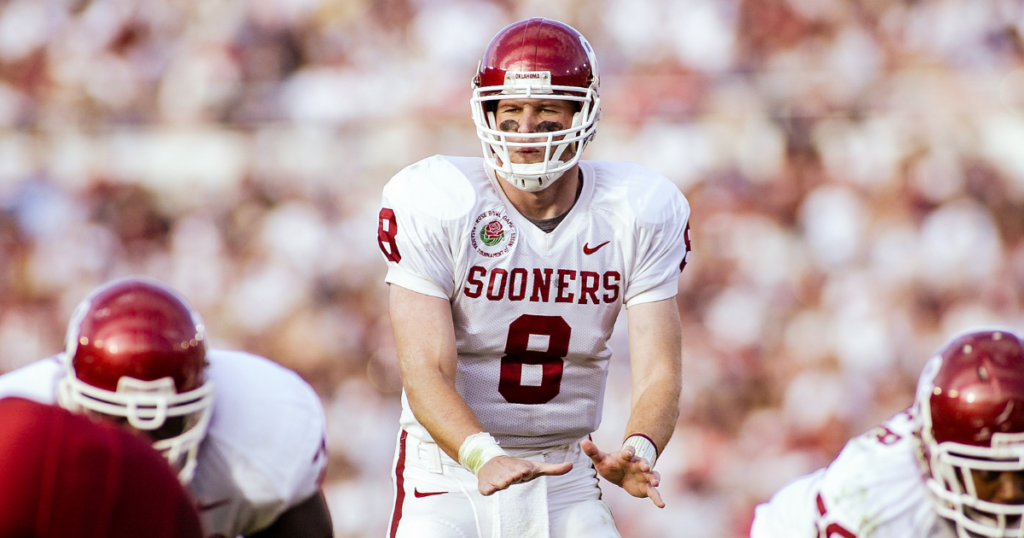
“There’s no doubt my brother paved a great path for me to be able to be here,” Ryan said. “My brother went through some tough times as a quarterback here. When you’re the quarterback at the University of Oklahoma – especially after the last one won the national championship and the backup was a future Heisman Trophy winner – it’s tough. But you have to have thick skin. And he fought through it and he did a great job. And people always knew he was a fighter. He was one of the toughest guys who ever played here.
“Our family name was respected here because of the work he put in and who he was in his soul, his mind, and his heart. That certainly helped me get a job here.”
But at the time, Ryan was also a candidate at Oklahoma State for an assistant coach opening. OSU is one of the best golf programs in the country and its opening was considered by some to be a better gig than OU’s head coach vacancy.
Castiglione knew this and still asked then-OSU athletic director Mike Holder – who won eight national titles as OSU’s men’s golf coach – for advice on who to hire. Holder said Ryan, despite also wanting to hire Ryan.
“He’s the best guy out there,” Holder told Castiglione. “In fact, I’m trying to hire him right now.”
Ryan strongly considered taking OSU’s offer before even interviewing with Oklahoma. In fact, it was then-OSU men’s golf head coach Mike McGraw who drove Ryan from Stillwater to Jimmy’s Egg in Moore so he could meet with Castiglione.
And it was there, after scrambled eggs, hash browns, and a tour of OU’s facilities, that Castiglione convinced Ryan to come to Oklahoma.
“I knew there was competition there,” Castiglione said. “And I had to wait for him to finish his interview with Oklahoma State. Mike dropped him off and the rest is history.”
Ryan looked at the opportunity as a challenge. He also had an affinity for Oklahoma, having watched his brother play football in Norman. While he was a Bulldog on the golf course, he was an OU football fan even after his brother graduated.
And having known Castiglione since that dinner at Golden Corral, he knew he would be given the tools to succeed. He and Castiglione had a vision of making OU golf prominent again.
“This job wasn’t very sought after,” Ryan said. “It was one of the jobs that it had to probably be put on a young guy who is naive, ignorant in a lot of ways, guns a-blazin’, willing to do anything and everything at the time to try and figure it out. An old, grizzled coach – I don’t know if they would’ve been ready to saddle up for that. I think it was a perfect match for us. And I’ll tell you, my first couple years, there were a lot of question marks.”
Building a program at Oklahoma
Ryan remembers his first recruiting trip as OU’s head coach to a junior tournament in Cape Girardeau, Missouri.
He had been used to recruiting with the Georgia logo, one of the top programs in the country. He quickly found out that Oklahoma didn’t have the same pedigree, with many players not giving him the time of day.
“The program was in a real tough spot,” Ryan said. “But we believed in our vision.”
Ryan spent the first two and a half months on the job living out of the local Residence Inn. He was tireless in trying to turn the program around, setting the foundation with the foresight of a program. He built it on top-notch facilities, elite recruiting, and a belief to be great.
He had renderings made of what he hoped Jimmie Austin would become and shared them with Castiglione. A few years later, Jimmie Austin received many of the renovations Ryan pushed for, including arguably the best ransom short course in the NCAA. It’s now considered one of the best facilities and courses in college golf.
Ryan still has those renderings in his office, serving as a reminder of how far the program has come.
“He was a visionary,” Castiglione said. “He had those blueprints – I guess they were more primitive drawings at the time – and you think about those conversations of how an administrator and a coach work together to build a program… He had a vision for every aspect of the program. And that’s what makes it more gratifying and he deserves all the credit for that.”
He was fearless on the recruiting trail. He recruited some of the top golfers, including Abraham Ancer, who was considered the No. 1 junior college golfer in 2009-10. Ancer has since gone on to compete on the PGA Tour and LIV Golf Tour. And while he zeroed in on top talent, he also prioritized recruiting golfers who he felt were team centric.
“When it comes to what we’re trying to provide, it’s a sense of pride and belonging and family that I feel like is unmatched anywhere else,” Ryan said. “Some people will scoff at that and say, ‘Well everybody’s trying to do the same thing. You’re not any different.’ I disagree with that. You see it with our former players. They come back and want to be a part of it and that’s because of years of us trying to bring in the proper guys for our program.”
And above all, he instilled a belief in his players that Oklahoma could be a golf powerhouse. He believed they had all the tools to be a successful team. That started by winning the first tournament of his career – the Kansas Invitational in August 2009.
The scorecard still hangs above his office door.
“Even though he was a head coach for the first time, I think he took that as a challenge,” Kropp said. “He took it head-on like he does with everything in his life. From the get-go, it was, ‘We are turning this thing around. We’re going to be a top program. We’re going to act like a top program.’ And he just kind of set that bar for everybody on the team.”
Ryan said he wants to continue to elevate that bar, hoping to soon win another national title. And they’ve been close in recent years, finishing runner-up in 2021 and finishing in the final four in 2022. He said this year’s team is “trending in the right direction” to make a run, after winning the Big 12.
But Ryan also said not winning another national title doesn’t bother him. All he wants is for his players to have an opportunity to win. And in his 14 years as Oklahoma’s head coach, he’s provided that nearly every year.
“Coach Ryan is trying to build a dynasty there and build a team that can compete for a national title every year. And that’s been the case the last decade or so,” Dalke said. “Every year people say, ‘Oh, they lost Quade Cummins or Logan McAllister or whoever. They’re going to drop off.’ But every year there is Oklahoma again competing for a national championship. He’ll never take his foot off the gas.”
Dalke is right – Ryan has no plans of slowing down. At 41, he’s still a relatively young coach. Rarely does he reflect on the success of his career and even more rarely does he think about the future. He’s constantly focused on the present.
And right now, that’s competing in regionals this week and, hopefully for him and his team, another national title run.
“I love what I do. I love coaching. I love the locker room,” Ryan said. “These guys, they don’t change their age. They’re 18 to 23 every year. And I think that’s why we as coaches fall in love. Because even as you get older, it keeps you young. I still feel like the 27-year-old when I first got here and I think that’s hard to give up…
“I view my career sort of like I described the program earlier – where’s the next elbow going?”
